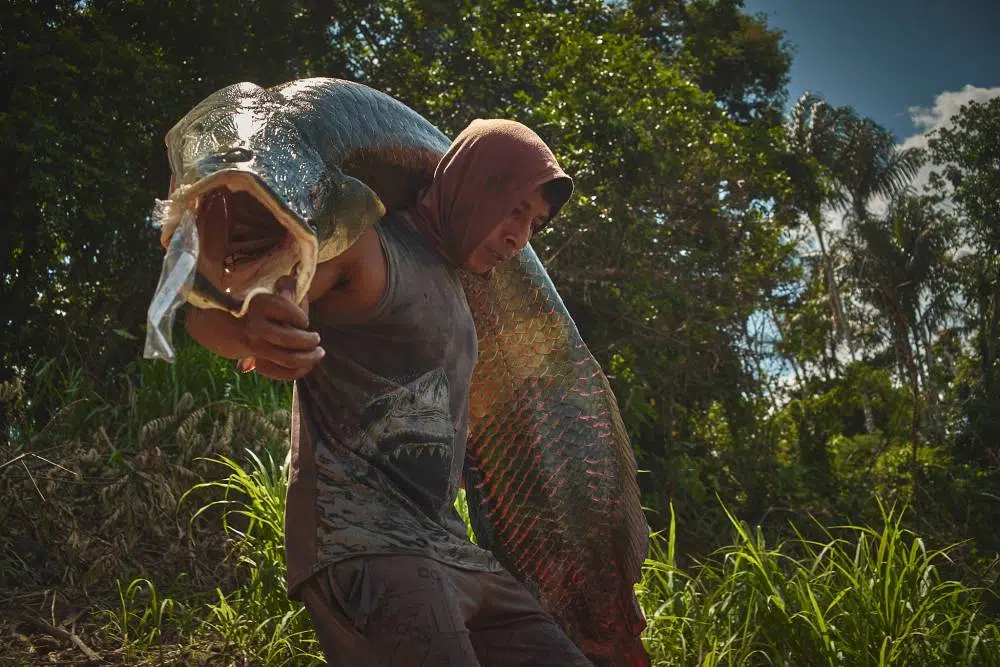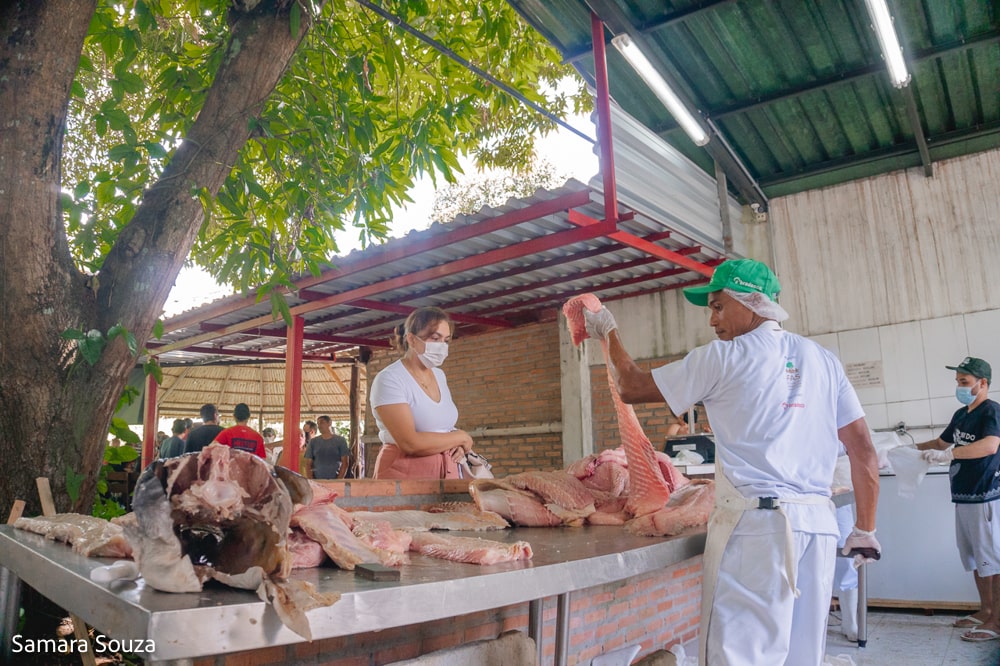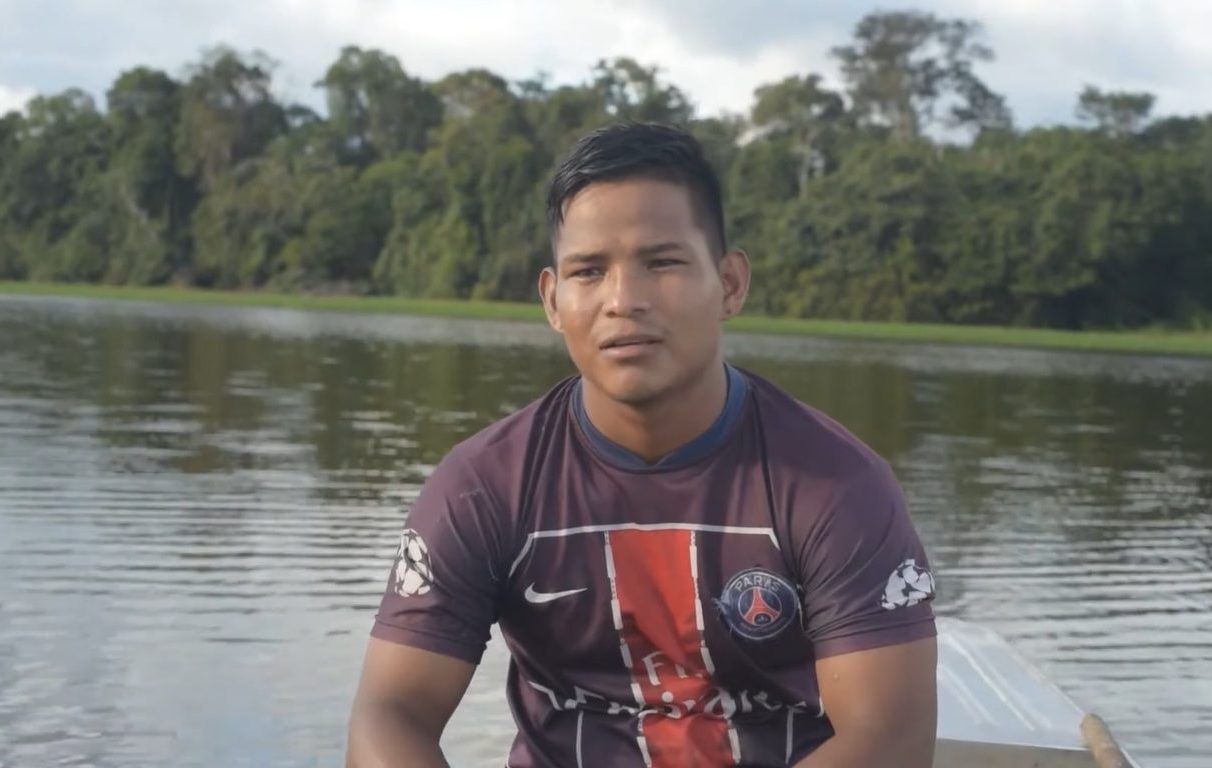With FAS support for the sustainable fishery management production chain, the average family income of fishermen in the Amazon increased by 66% in 5 years (2016- 2020)
From being the protagonist of the Amazon aquatic fauna, a few years ago the pirarucu had become a rare presence in the rivers and lakes of the region, an effect of rampant predatory fishing. “If you saw two or three pirarucus, it was too many,” remembers Raimundo Gomes, resident of the Sustainable Development Reserve (SDR) Mamirauá, in the state of Amazonas. The successful partnership between traditional knowledge and science saved the pirarucu from local extinction and, through the sustainable management of the species, ensured food security and a source of income for local populations.
The sustainable fishing of pirarucu has the incentive of the Sustainable Amazon Foundation (FAS), which offers local communities technical advice and infrastructure support for the practice of management. Between 2016 and 2020, fishermen from sustainable management projects supported by FAS had an increase in income of 66%, with an average income of R$2,349.57.
“We guarded the lake, and from about three years on, the income from pirarucu appeared,” says Raimundo. “The first count we did was of two hundred and seventy large pirarucus and, thank God, since then the income from the lakes has increased”.
The Giant of the Amazon: Pirarucu Management | Episode 1
The pirarucu is a giant of the fresh waters: one specimen can reach up to 3 meters in length and weigh 200 kilos. Managing this colossal species is a collective work that requires time, preparation, and organization, involving entire communities in Conservation Units (UCs), where fishing is legalized and regulated by the responsible environmental agencies. Between the processes of defense and surveillance of the lakes, where the reproduction of the fish occurs, counting, fishing, processing, and trading, thousands of people are part of this productive chain native to the Amazon.

Photo: Rodolfo Pongelupe
To make the stages of management viable, FAS invests in fishing equipment, river transport, radio communication, and floating bases, structures that give support to the surveillance of the lakes. “For me, FAS has been an excellent help to us, because first when we came here to monitor, we lived inside the canoe, and today we have this floating base, a boat where we can pull over here (on the lake). We used to come here to the lake in the canoinhas from there (in the community)”, says Antônio Ferreira, fisherman from the Batalha Community, located in Mamirauá’s RDS.
“As soon as these fishermen groups take on this stage of protection and surveillance, that they are occupying the territory, they are doing territorial management of their spaces, in one of the best examples of conservation, income generation, and valuing the people who are in the forest,” says Marcelo Castro, FAS Knowledge Management coordinator.
As part of the strategy to enhance the productive chain of fish, since 2014 FAS promotes pirarucu marketing fairs in Manaus, capital of Amazonas state. Held periodically, the fairs are a moment of direct contact between managers and consumers, who can learn about the work involved in fishing and fish conservation.
Only in 2022, FAS supported the commercialization of 105 tons of pirarucu, generating a gross revenue of R$ 1,083 million. More than 25 tons of fish were sold in pirarucu fairs held in Manaus. The commercialization is authorized by the Brazilian Institute of Environment and Renewable Natural Resources (Ibama) and the State Secretariat of Environment (Sema/AM), with support from the State Secretariat of Rural Production (Sepror) and financing from the Amazon Fund and Bradesco.
“When this producer arrives here in Manaus and is able to talk directly to the final consumer, he tells the story of how the management is done. To this product is being added a value, because it is not selling any kilo of pirarucu, is selling a story, is selling a work of conservation and maintenance of biodiversity within these Conservation Units”, explains Edvaldo Correa, coordinator of the Standing Forest Program of FAS.

Photo credit: Samara Souza
Fancy and malleable, the pirarucu skin has also become a great business for the managers. Through a partnership between FAS and the textile company Nova Kaeru, the skin that comes from the sustainable management of the Mamirauá Reserve is commercialized, transformed into leather, and ended up in the catalog of international brands such as Louis Vuitton.
Bags and shoes, among other pieces, stamp the reddish scales of pirarucu that, only between 2018 and 2022, earned the Association of Residents and Users of Sustainable Development Reserve (RDS) Mamirauá Antonio Martins (Amurman) thousands of reais in sales. FAS supports the sale and organic production of pirarucu skin and offers the group, among other actions, commercial and financial guidance and workshops for removal, logistics, freezing and proper storage of skins.
“FAS is a very good partner for us, because they brought this partnership for the sale of pirarucu and the skin. It is an important resource, which is ensuring sustainability for the families of fishermen and managers who live off fishing. It is a privilege for us, a great benefit”, says Maria do Rosário, resident of the Nova Esperança community in Mamirauá’s RDS.
In search of a fair price for the managed pirarucu and income generation for the producers, FAS also invests in training courses for fishermen and projects, such as the installation of storage units in the management regions.

Photo credit: Rodolfo Pongelupe
“The management has developed a lot over the years and improved a lot. I hope my brothers and cousins see this as income going forward. They have their parents as a mirror to follow that forward, what their father left them, to have this here as their property. And that they fight for this, as I do too. I live from this and fight for this”.
Joilson de Souza, pirarucu manager in the Mamirauá Sustainable Development Reserve (AM)
Read the study “Supporting Pirarucu Fishing as a Business in the Amazon“, a partnership between FAS and the University of Notre Dame:

